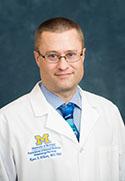June 2, 2017:
Investigator Spotlight

Dr. Ryan Alan Wilcox
Ryan Alan Wilcox, M.D., Ph.D., assistant professor of hematology, University of Michigan Comprehensive Cancer Center
Member of the Big Ten Cancer Research Consortium Lymphoid Malignancies Clinical Trial Working Group
Interests: T-cell non-Hodgkin’s lymphomas
- Medical School or Training
- Mayo Medical School, 2004
- Residency
- Mayo Clinic, Internal Medicine, MN, 2007
- Fellowship
- Hematology/Oncology, Mayo Clinic, 2011
- Board Certification
- Internal Medicine
- Medical Oncology
- Hematology
The T-cell lymphomas are a heterogeneous and poorly understood group of non-Hodgkin’s lymphomas. The most common T-cell lymphoma in the United States includes a heterogeneous mix of lymphomas that lack distinguishing characteristics and, until recently, remained clinically and molecularly “unspecified.” Improved understanding of T-cell lymphoma pathogenesis and the development of novel therapeutic strategies will be needed to address this challenge and improve outcomes for patients afflicted with these aggressive lymphomas.
Our group made the landmark discovery that the most common T-cell lymphoma in North America is comprised of two molecularly and clinically distinct subsets. This finding has significant implications for the classification and treatment of these lymphomas. We have also demonstrated that malignant T cells remain dependent upon antigen-presenting cells within the tumor microenvironment, and are developing novel therapeutic strategies targeting these cells.
Many fundamental questions, including the “cell of origin,” the role of antigen-, costimulatory-, and cytokine-receptor signaling, and the contribution of myeloid-derived antigen-presenting cells in disease pathogenesis remain obscure. It is our hope that complementary work performed in mouse models and primary T-cell lymphoma specimens (in ex vivo and patient-derived xenograft studies) will address these fundamental and clinically relevant questions. We are poised to clinically translate these laboratory-based findings into novel therapeutic strategies that we hope will improve outcomes for patients afflicted with these aggressive lymphomas. I enjoy working with a multidisciplinary team of enthusiastic collaborators who share this common goal.
Thought Leader Perspectives
Eric R. Fearon, M.D., Ph.D., director, University of Michigan Comprehensive Cancer Center and Emanuel N. Maisel Professor of Oncology

Dr. Eric R. Fearon
If you think of cancer as a mountain and getting to the top as the cure, every cancer patient has his or her unique mountain to climb. Each cancer is distinctive at the genetic and biological level, meaning we’re looking at potentially thousands of diseases to treat. It is not a single problem to solve.
Fortunately, cancer researchers are learning and making discoveries at a rapid pace. They are studying each mountain and exploring new routes to the top. Dozens of other routes on the back or the flanks might be less obvious and some might even be dead ends or simply too steep, but the goal is to reach the summit. Each new route and the discoveries that it brings can potentially offer new approaches to cancer treatment.
Every experiment generates interesting observations. Trying to understand biological issues and how they can inform new approaches to treatment. We must take advantage of observation with potential for impact. Chipping away at the problem is how we move the field of cancer forward.
When I began working in cancer genetics research in 1983, studying even a single gene in cancer of a particular type was very difficult and could take years. Now we can take individual cancers and study all of the genes in great depth in just days to weeks, allowing us to identify drugs that may be used to treat a patient’s cancer.
We have made exciting progress in targeted therapies that aim to inhibit the genetic defects that fuel and sustain cancer, with fewer side effects and significant benefit for patients. We have immune-based approaches to harness our body’s ability to seek out and destroy cancer in the body. There is enormous potential to further harness the immune system for cancer treatment.
Some cancers can now be cured. Others—formerly deadly illnesses—are treated more like chronic illnesses that can be managed. We continue to study the underpinnings of what drives and fuels the cancer types that are difficult to cure. This is where being open to discovery comes in. Every experiment generates interesting observations. Researchers must be willing to sift through data for clues. Some of the most significant insights for the cancer field have come unexpectedly.
About the Big Ten Cancer Research Consortium: The Big Ten Cancer Research Consortium was created in 2013 to transform the conduct of cancer research through collaborative, hypothesis-driven, highly translational oncology trials that leverage the scientific and clinical expertise of Big Ten universities. The goal of the Big Ten Cancer Research Consortium is to create a unique team-research culture to drive science rapidly from ideas to new approaches to cancer treatment. Within this innovative environment, today’s research leaders collaborate with and mentor the research leaders of tomorrow with the unified goal of improving the lives of all patients with cancer.
About the Big Ten Conference: The Big Ten Conference is an association of world-class universities whose member institutions share a common mission of research, graduate, professional and undergraduate teaching and public service. Founded in 1896, the Big Ten has sustained a comprehensive set of shared practices and policies that enforce the priority of academics in the lives of students competing in intercollegiate athletics and emphasize the values of integrity, fairness and competitiveness. The broad-based programs of the 14 Big Ten institutions will provide over $200 million in direct financial support to almost 9,500 students for more than 11,000 participation opportunities on 350 teams in 42 different sports. The Big Ten sponsors 28 official conference sports, 14 for men and 14 for women, including the addition of men’s ice hockey and men’s and women’s lacrosse since 2013. For more information, visit www.bigten.org.














Subscribe to the Big Ten CRC Newsletter X
X Facebook
Facebook YouTube
YouTube